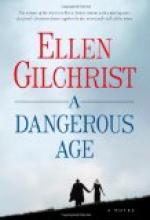Such is the inward conflict which forms the subject of The Dangerous Age. It must be conceded that it lacks neither greatness nor human interest.
* * * * *
I wish to add a few lines in order to record here an impression which I experienced while reading the very first pages of The Dangerous Age; an impression that became deeper and clearer when I had closed the book.
The Dangerous Age is one of those rare novels by a woman in which the writer has not troubled to think from a man’s point of view. I lay stress upon this peculiarity because it is very rare, especially among the contemporary works of Frenchwomen.
The majority of our French authoresses give us novels in which their ambition to think, to construct and to write in a masculine style is clearly perceptible. And nothing, I imagine, gives them greater pleasure than when, thanks to their pseudonyms, their readers actually take them for men writers.
Therefore all this mass of feminine literature in France, with three or four exceptions—all this mass of literature of which I am far from denying the merits—has really told us nothing new about the soul of woman. A strange result is that not a single woman writer of the present day is known as a specialist in feminine psychology.
Karin Michaelis has been inspired to write a study of womankind without trying to interpose between her thought and the paper the mind and vision of a man. The outcome is astonishing. I have said that the construction of the novel is solid; but no man could have built it up in that way. It moves to a definite goal by a sure path; yet its style is variable like the ways of every woman, even if she be completely mistress of herself.... Thus her flights of thought, like carrier-pigeons, never fail to reach their end, although at times they circle and hover as though troubled by some mysterious hesitancy or temptation to turn back from their course....




